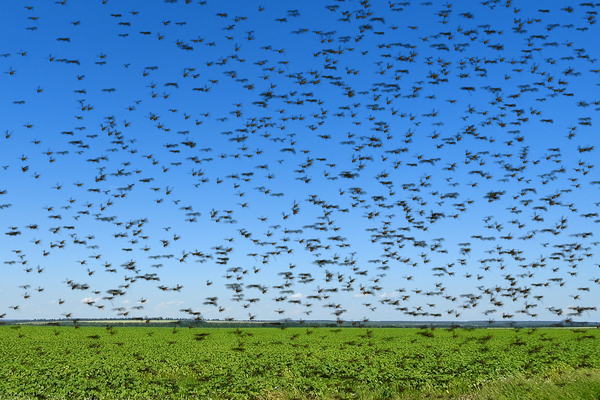When a solitary locust joins a group, the bacterial composition of its gut transforms, possibly causing dramatic behavioral changes.
By Sharon Wrobel, The Algemeiner
Israeli researchers may have come closer to explaining the “mystery” of a plague that dates back to biblical times.
Tel Aviv University scientists developed a theory to explain why individual, harmless locusts radically change their behavior when they aggregate, forming huge swarms and devastating millions of hectares of land worldwide.
Led by Prof. Amir Ayali from TAU’s School of Zoology, the study focused on the microbiome — all of the bacteria, viruses, and fungi that live in and on the body — and found that when a solitary locust joins a group, the bacterial composition of its gut undergoes a distinct transformation.
“The most significant change was observed in bacteria called Weissella, almost completely absent from the microbiome of solitary locusts, which became dominant soon after their hosts joined the group,” said Omer Lavy, a zoology Ph.D. student and one of the study’s authors, in a press release on Wednesday.
For the purpose of the study, which was published late January in the peer-reviewed journal Environmental Microbiology, the researchers reviewed the gut microbiomes of lab-raised desert locusts. They found a notable difference when individual, solitary-reared insects joined a group of some 200 locusts.
They then created a mathematical model to demonstrate “that swarming may be advantageous to the altered microbiome’s dominant bacterial species, which spreads by infecting large numbers of locusts,” the researchers noted. “In other words, the bacteria may in some way encourage their hosts to change their behavior and become more ‘sociable.’”
“Our study contributes to the understanding of locust swarming — a leading cause of famine from biblical times to the present,” said Ayali. “Our findings do not prove unequivocally that the Weissella bacteria are responsible for the swarming and migration of locusts.”
“The results do however suggest a high probability that the bacteria play an important role in inducing this behavior — a new hypothesis never previously proposed,” he added.
During plagues, desert locusts can spread over more than 11 million square miles with the potential to damage the livelihood of a tenth of the world’s population, according to the United Nations. A locust swarm of just about a third of a square mile can consume as much food as would be eaten by 35,000 people in a single day.
“Over the last three years large parts of Africa, India and Pakistan have been hard-hit by locust outbreaks, and climate change is expected to exacerbate the problem even further,” Ayali cautioned. “We hope that this new understanding will drive the development of new means for combating locust outbreaks — still a major threat to countless people, animals, and plants all over the globe.”
Bring Joy to Israeli Soldiers - Send Winter Care Packages!
We are honored to thank the young men and women of the IDF who risk their lives every day to defend the citizens of Israel.
Join us in sending winter care packages and personal notes of support to Israeli soldiers who are out in the cold all day.
Warm up a soldier's heart with essential winter wear including fleece jackets, hats, gloves and more. Keep an entire unit warm!
THE SOLDIERS REALLY APPRECIATE YOUR LOVE AND CONCERN!
Click Here to Send Your Gift and Personal Note to Israeli Soldiers

